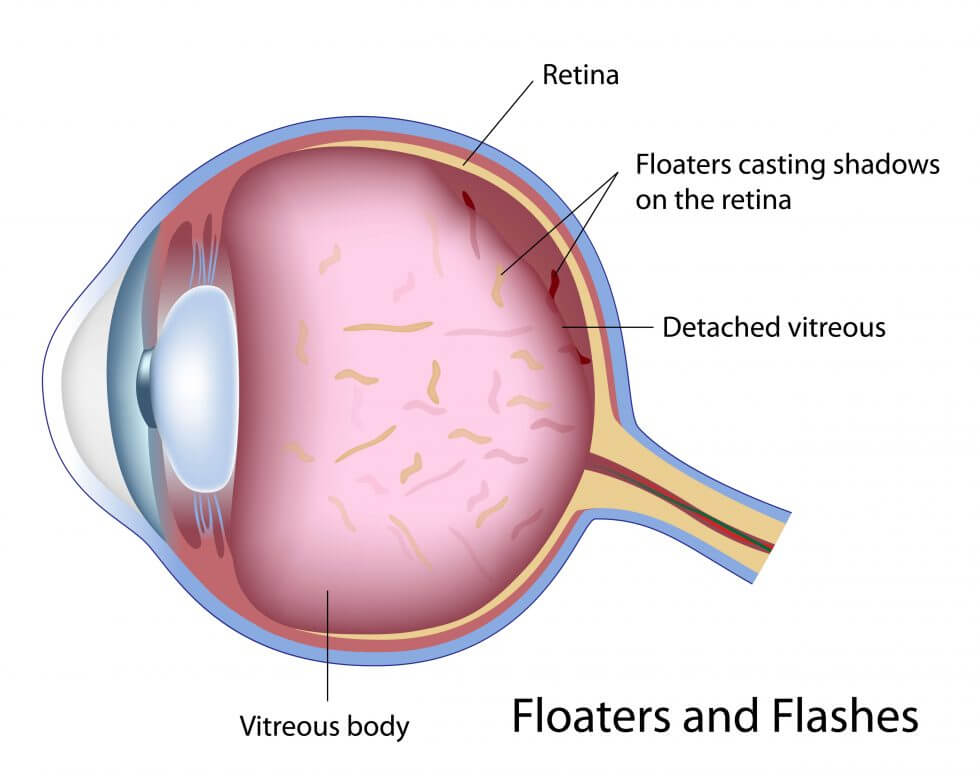
Several eye conditions come and go without causing any damage to our vision. That said, it is critical to see a qualified ophthalmologist for a routine eye exam.
If you have ever experienced flashes or floaters, you may have wondered if this should be of concern. In most cases, they are not, but they can sometimes be a sign of other eye conditions.
Keep reading to learn more about flashes and floaters, and if you should be worried!
Flashes and Floaters
At some point in life, you may see spots, bubbles, or web-like images floating in your field of vision. These are floaters.
What’s more, they exist within the eye, despite the illusion that they’re in the surroundings. That’s why when you move your eyes, the spots move too, and you are never able to focus your sight on them.
Flashes are flashes of light that may appear like starbursts or streaks of lightning in your field of vision.
What causes flashes and floaters?
Many people may experience flashes and floaters, but rarely do they indicate any serious eye problems. Floaters usually occur as a result of the following:
Shrinking of the Vitreous Humor
The vitreous humor is the transparent gel found between the retina and lens of the eye. Hyaluronic acid and collagen are part of its solid components.
When shrinking occurs, the acid releases water, which facilitates liquefaction of the humor. Liquefaction is the process of making or becoming liquid.
As a result, the collagen breaks down to shreds. Floaters are the shadows cast by these shreds on the retina once they clump together.
Retinal Detachment
The vitreous is joined to the retina by the vitreous membrane. When the humor begins shrinking, the membrane may detach itself from the retina.
This detachment may cause mechanical disruption to the retina. The mechanical disruption of the retina is what brings about flashes.
Sudden onset of flashes and floaters at the same time may be a sign that the membrane has caused a tear in the retina. Such a case requires immediate medical attention from an eye doctor.
It’s also important to note that floaters may appear as a result of any of these conditions:
- Myopia
- Eye inflammation
- Eye tumor
- Bleeding in the eye
Is there any treatment for flashes and floaters?
Flashers and Floaters are treated in the following ways:
Laser Surgery – surgery where laser energy is used to break up the clumps in the humor.
Vitrectomy – an invasive surgery where your eye surgeon removes part of the vitreous humor through an incision., removing the specks in your eye.
A salt solution then replaces the vitreous. The salt solution takes over the function of the vitreous until the eye produces more of the natural gel.
See an ophthalmologist at Shoreline Vision if your floaters and flashes appear suddenly or increase in intensity.
What are the risks associated with treating flashes and floaters?
Flashes can be quite annoying. But your eye doctor will most likely not recommend any treatment. Flashes tend to settle down after a while without treatment.
Although rare, floaters can become so numerous and dense that they affect your vision. If this occurs, your eye doctor may perform a vitrectomy or laser treatment. This removes the floaters from your vitreous.
In case of complications, vitrectomy carries serious risks. These include cataracts, retinal detachment, and retinal tears.
Most surgeons are reluctant to resort to this surgical procedure unless the floaters significantly interfere with your vision.
In the hands of experienced eye surgeons, laser treatment is the safest procedure for floaters. The procedure has a very low risk.
In rare cases, complications such as retinal detachment or tear, hemorrhage, cataract, glaucoma, and others may occur.
Have more questions about flashes and floaters? Request an appointment at Shoreline Vision today.
Request an Appointment
Please note we are seeing patients by appointment only, including optical. Call 231.739.9009
or click here.





